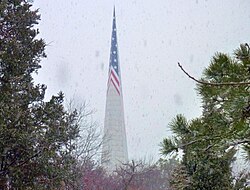Farmingville, New York
| Farmingville, New York | |
|---|---|
| Hamlet and census-designated place | |

Vietnam Memorial on Bald Hill
|
|
 U.S. Census map |
|
| Location within the state of New York | |
| Coordinates: 40°50′33″N 73°2′37″W / 40.84250°N 73.04361°WCoordinates: 40°50′33″N 73°2′37″W / 40.84250°N 73.04361°W | |
| Country | United States |
| State | New York |
| County | Suffolk |
| Area | |
| • Total | 4.1 sq mi (10.7 km2) |
| • Land | 4.1 sq mi (10.7 km2) |
| • Water | 0.0 sq mi (0.0 km2) |
| Elevation | 105 ft (32 m) |
| Population (2010) | |
| • Total | 15,481 |
| • Density | 3,700/sq mi (1,400/km2) |
| Time zone | Eastern (EST) (UTC-5) |
| • Summer (DST) | EDT (UTC-4) |
| ZIP code | 11738 |
| Area code(s) | 631 |
| FIPS code | 36-25417 |
| GNIS feature ID | 0949921 |
Farmingville is a hamlet and census-designated place (CDP) in Suffolk County, New York, United States. The population was 15,481 at the 2010 census.
Farmingville is in the town of Brookhaven. The Brookhaven Town Hall is on the east side of Bald Hill in the community.
Sachem High School East is located in Farmingville.
The first settlement in what is now called Farmingville occurred in the late 18th century, and was called Bald Hills and Mooney Ponds, before it eventually was called Farmingville (though the soil and hills are not good for agriculture). The Keibel Family had a 72-acre fruit and vegetable farm from 1950 till 1982. It did not have its own post office until 1950.
The home of Elijah Terry, the first teacher in the local school, was built in 1823 and sits next to the Bald Hills Schoolhouse, built in 1850. The schoolhouse is in the National Register of Historic Places.
Bald Hill, one of the highest points on Long Island, is located on the Ronkonkoma Moraine, where the glacier which formed Long Island stopped its advance. At the top of Bald Hill is Vietnam Memorial Park, which includes an obelisk-shaped monument painted red, white, and blue, which was dedicated on Nov. 11, 1991. The Bald Hill Cultural Center features the outdoor Brookhaven Amphitheater and was previously the location of a ski area from 1965-80.
As of the census of 2000, there were 16,458 people, 5,041 households, and 4,229 families residing in the CDP. The population density was 3,642.8 per square mile (1,405.9/km²). There were 5,170 housing units at an average density of 1,144.3/sq mi (441.6/km²). The racial makeup of the CDP was 79.9% White, 2.2% African American, 0.1% Native American, 3.7% Asian, 0.2% from other races, and 1.3% from two or more races. Hispanic or Latino of any race were 12.5% of the population.
...
Wikipedia

